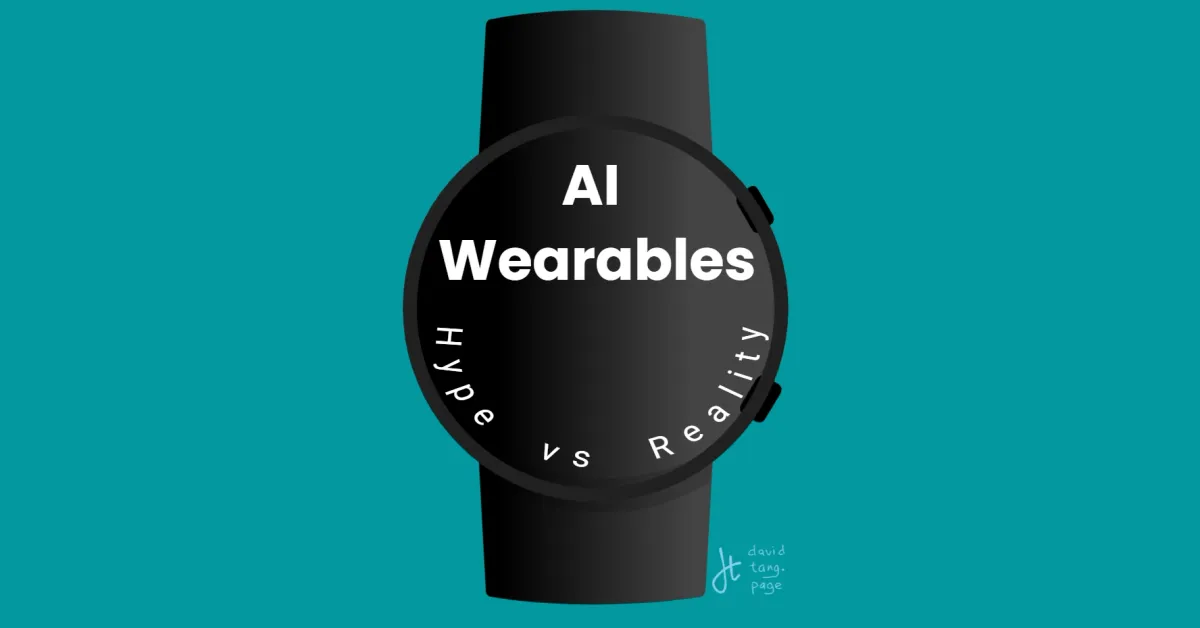AI Wearables - Hype vs reality 2024

What's the Fuss with Wearables?
I see incredible potential for wearables in the next decade or two. (Let's be honest, it's pretty difficult to predict the next five years, let alone twenty!) We're experiencing an undeniable acceleration in the build-up of health data. Never before have we had such a digital and live-streaming view of our bodies.
For the uninitiated, Fitbits are a classic example of wearables.
Advancements in IoT, battery tech, wireless technology, increasingly powerful chips, and a focus on health are all fuelling the wearables space. Add the latest AI boom to the mix, and we could be on the cusp of the next 'iPhone' moment. Big players like Motorola and Samsung are actively exploring wearable phones.
This isn't a completely new idea, though. Remember Lenovo's concept flexible mobile from over 7 years ago? In some distant, sci-fi future, we might have fully integrated health monitoring tech woven into our clothes, with nanobots enhancing our cells on a molecular level!
We're not there yet (maybe in another hundred years?), but it highlights the game-changing potential of wearables.
Wearables – State of Play 2024
Let's come back to the present. I've been diving into the current landscape of AI-powered wearables. Here's what's caught my eye:
Humane AI Pin
This wearable AI assistant, with no screen but a built-in projector, initially gave me serious Ironman/Jarvis vibes. However, early testing and reviews (like the one by MKBHD) were... well, let's just say they weren't glowing. It's been compared to a smartphone with the ChatGPT app, and the smartphone wins in almost every aspect except maybe screen time.

This has pretty much dampened hopes for consumer success, and the team is reportedly considering selling to HP. We also can't ignore the current economic climate – consumers are feeling the pinch of inflation and settling into a post-pandemic world with a dose of geopolitical uncertainty.
This is disappointing news for me. I was hoping for the Humane AI Pin to shake things up and bring some much-needed innovation to wearables. Maybe they could have redeemed themselves by adding some health or fitness tracking features.
rabbit r1
Essentially a physical device housing ChatGPT, with some "teenage engineering" flair (think bright colors and steampunk vibes), the rabbit r1 is another contender.

While it has escaped the full brunt of criticism faced by Humane, it's still not garnering overwhelming enthusiasm:
- Pros: Automation workflows for Airbnb and groceries, cheaper pricing and no subscription (unlike Humane), nice physical buttons, camera, and a few more features.
- Cons: Relies heavily on ChatGPT, leading to latency issues. Most tech outlets (Verge, CNET, MKBHD) don't recommend it, despite 50,000 pre-orders.
Their website claims the r1 is the "future of AI," but I'm not convinced. Recent data and security leaks doesn't look good on them though. I'll give them credit for the packaging and novelty factor - that's about it.
Samsung Galaxy Ring
Another player entering the scene is the Samsung Galaxy Ring. It looks like a direct competitor to the Oura ring, which I like for its no-screen approach to fitness tracking.

The Galaxy Ring is still in the prototype stage, but it's been previewed by journalists and tech reporters. We've seen some pictures, but no pricing details yet.
- Potential: Could offer advanced features like ECG monitoring. Samsung's large smartphone and Android base could give them a leg up in terms of app development and testing.
- Challenges: Competitive market segment means pricing needs to be just right.
Next Up
In a future post, I'd like to take a deep dive into "Apple Intelligence" and their growing suite of AI integrations. Stay tuned!
